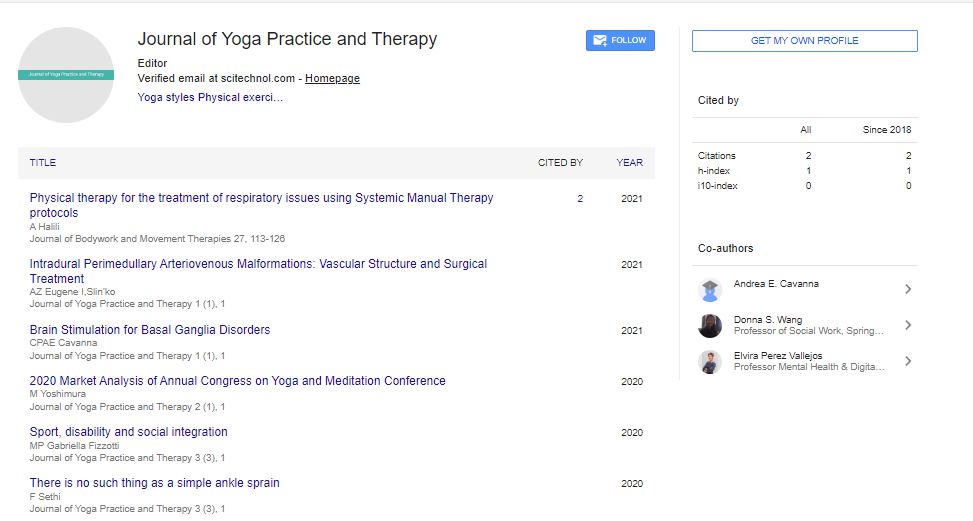Perspective, J Yoga Pract Ther Vol: 6 Issue: 2
The Benefits of Meditation: Developing Inner Calm and Resilience
Rishi Verma*
1Department of Yoga Psychology, University of Rishikesh, Rishikesh, India
*Corresponding Author: Rishi Verma,
Department of Yoga Psychology,
University of Rishikesh, Rishikesh, India
E-mail: vermarishi123@gmail.com
Received date: 29 May, 2023, Manuscript No. JYPTY-23-107038;
Editor assigned date: 31 May, 2023, PreQC No. JYPTY-23-107038 (PQ);
Reviewed date: 14 June, 2023, QC No. JYPTY-23-107038;
Revised date: 21 June, 2023, Manuscript No. JYPTY-23-107038 (R);
Published date: 28 June, 2023, DOI: 10.4172/jypty.1000121
Citation: Verma R (2023) The Benefits of Meditation: Developing Inner Calm and Resilience. Int J Yoga Therap 6:2.
Description
In today's fast-paced and demanding world, stress and anxiety have become all too common in our lives. The pursuit of success and the constant influx of information can leave us feeling overwhelmed and emotionally drained. In this chaotic landscape, meditation offers a sanctuary of peace and a path to developing inner calm and resilience. Rooted in ancient wisdom, meditation has gained widespread recognition as a powerful practice that nurtures the mind, body, and spirit.
Art of meditation
At its essence, meditation is a practice that encourages mindfulness and the ability to be present in the current moment. It involves various techniques that allow individuals to quiet the mind, observe their thoughts and emotions without judgment, and ultimately experience a deep sense of inner peace.
Mindfulness meditation: This popular form of meditation involves paying attention to the present moment, such as focusing on the breath, bodily sensations, or the environment. It allows individuals to develop a heightened awareness of their thoughts and feelings, leading to greater self-understanding and acceptance.
Loving-kindness meditation: Also known as Metta meditation, this practice involves directing well-wishes and compassion towards oneself and others. It fosters feelings of kindness, empathy, and interconnectedness, promoting emotional resilience and social harmony.
Transcendental Meditation (TM): TM is a technique that involves repeating a specific mantra silently, which helps the mind settle into a state of deep relaxation and stillness. It is known for its ability to reduce stress and anxiety effectively.
Yoga and meditation: Many forms of yoga incorporate meditation as a central component. By combining physical postures with breath awareness and mindfulness, yoga meditation promotes a harmonious balance between body and mind.
Benefits of meditation
Inner calm and reduced stress: One of the primary benefits of meditation is its ability to induce a state of deep relaxation, leading to reduced stress and anxiety. By calming the mind and body, meditation helps lower the production of stress hormones, contributing to an overall sense of inner calm and well-being.
Enhanced emotional regulation: Regular meditation enables individuals to develop emotional intelligence and self-awareness. By observing their emotions without attachment, meditators can respond to challenging situations with greater equanimity and resilience.
Improved focus and concentration: Meditation trains the mind to be present and focused, enhancing concentration and productivity in daily activities.
Boosted immune system: Studies have shown that meditation can positively impact the immune system, leading to better overall health and resistance to illnesses.
Increased self-compassion: Meditation fosters self-compassion and self-acceptance, allowing individuals to be kinder to themselves and embrace imperfections with understanding.
Better sleep quality: Practicing meditation regularly can lead to improved sleep patterns and relief from insomnia.
Reduced symptoms of anxiety and depression: Meditation has shown promising results in alleviating symptoms of anxiety and depression. It provides individuals with a tool to manage negative thought patterns and cultivate a positive mindset.
Heightened resilience: Meditation strengthens the mind's capacity to cope with stress and adversity, enabling individuals to bounce back more effectively from life's challenges.
Incorporating Meditation into Daily Life
Incorporating meditation into daily life doesn't require elaborate rituals or a significant time commitment. Here are some practical tips for developing a regular meditation practice:
Start small: Begin with just a few minutes of meditation each day and gradually increase the duration as per the comfortable.
Set a routine: Choose a specific time and place for meditation to develop a consistent practice.
Conclusion
In a world filled with distractions and constant demands, meditation offers a sanctuary of inner calm and resilience. This ancient practice has proven benefits on mental, emotional, and physical well-being. By dedicating time to quiet the mind and cultivate mindfulness, individuals can experience a profound transformation in their lives. From reducing stress and anxiety to enhancing emotional regulation and self-compassion, meditation equips us with the tools to navigate life's challenges with grace and equanimity.
 Spanish
Spanish  Chinese
Chinese  Russian
Russian  German
German  French
French  Japanese
Japanese  Portuguese
Portuguese  Hindi
Hindi 